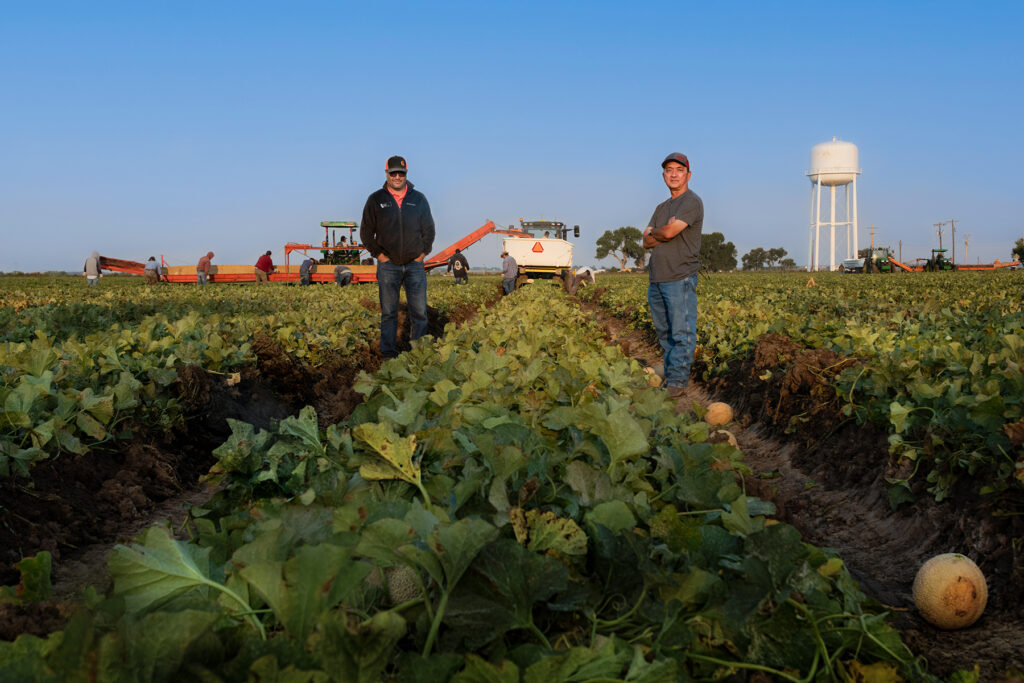
THE MELONEERS
The fruits of their labor blossom in Rocky Ford
By Coleman Cornelius | Photography by Mary Neiberg | Jan. 3, 2022
IT WAS JULY 30, and a poetry of seed, soil, sun, and snowmelt had transformed over three months into harvest. A trailer loaded with 24,000 pounds of cantaloupe pulled up to an enormous warehouse at Hirakata Farms in southeastern Colorado. The fragrance of summer – earthy and floral – wafted from the melons and filled the space. Now, work would shift into high gear.
A week earlier, Glenn Hirakata had picked a cantaloupe from his fields in Rocky Ford for a first taste. He cut into it that night.
“I couldn’t stop eating,” Hirakata texted his cousin and business partner, Michael Hirakata. It was some of the sweetest melon he could remember.
“What the heck?” Michael thought, knowing it was uncharacteristic of his cousin to be so effusive. “It must be really good.”
Hirakata Farms soon would supply every major grocer in Colorado with Rocky Ford Cantaloupe, named for a small town in the fertile Arkansas River Valley, which stretches across the Eastern Plains outside Pueblo.
Rocky Ford is synonymous with melon: In the 1880s, farmers here started growing watermelon, followed by cantaloupe; by the turn of the century, diners in New York City were savoring melon shipped from Rocky Ford. Today, several area farm families – united as the Rocky Ford Growers Association – raise a rainbow of watermelon, cantaloupe, and honeydew, shipping their branded melon throughout Colorado and into several neighboring states.
As one of Rocky Ford’s largest melon producers, Hirakata Farms annually grows nearly 2 million cantaloupes and even more watermelons and pumpkins, based on weight; the farm also raises alfalfa and field corn for livestock feed.
The Hirakata family and about 85 permanent and seasonal employees get all those melons out of fields and off to market in just eight weeks, often working from 7 a.m. to 10 p.m.
During intense harvest days, Glenn Hirakata is motivated by the thought of people enjoying the fruits of his labor – namely, melon known for a sweetness amplified by the region’s hot days and cool nights. “Your end goal is to harvest and have a good product for consumers. That’s what keeps you going,” said Hirakata, a fourth-generation farmer. He graduated from Colorado State University with a degree in agriculture in 1986. “Maybe some families are able to sit down and enjoy it together,” he mused. “That’s part of the gratification.”
But there are some days that pleasant thought is scant incentive, Hirakata admitted. Describing the challenges of farming, he paraphrased a quote from President John F. Kennedy, declared on the campaign trail in 1958: “The farmer is the only man in our economy who buys everything at retail, sells everything at wholesale, and pays the freight both ways.”
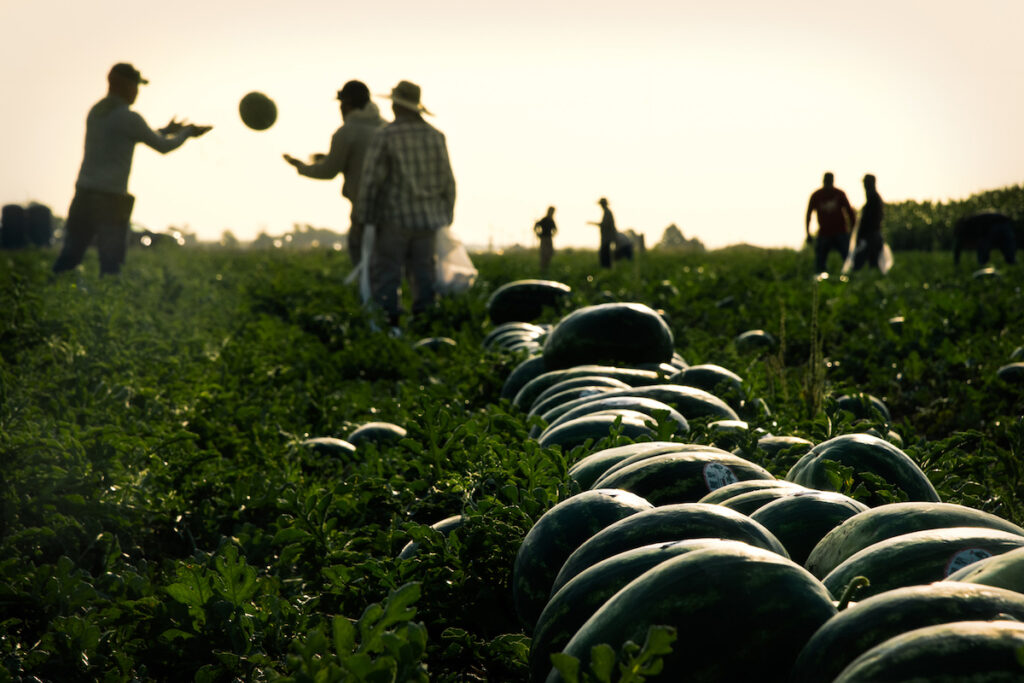
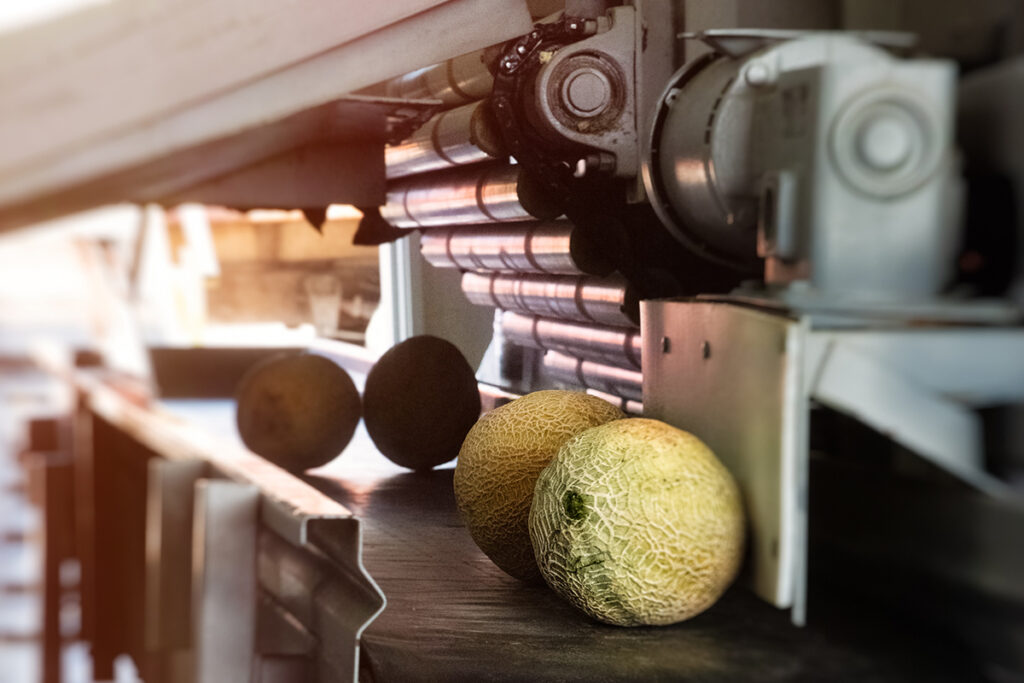
Hirakata Farms grows watermelons, cantaloupe, and pumpkins that are sold throughout Colorado and in neighboring states. The farm relies on seasonal farmworkers to harvest its produce; the Hirakatas, like many produce growers, count labor shortages among their top concerns.
More broadly, people growing the nation’s food often operate in conditions beyond their control, with little guarantee of profit. The unpredictability starts with weather: snow and freezing temperatures that descend unseasonably and can destroy vulnerable blossoms or fully ripened fruit still in the fields; hail that can pulverize plants and produce.
During Summer 2021, as the COVID-19 pandemic wore on, Hirakata Farms faced some of the same challenges that snagged supply chains and business operations around the globe. Fuel prices surged, increasing costs of operating farm equipment. Cardboard and shipping pallets – needed for transporting melon – were in short supply in the face of an online shopping boom; ditto truck drivers, whose insufficient ranks hindered the flow of supplies in many industries.
Then, there are the persistent concerns, the big three for fruit and vegetable growers: water, labor, and food safety. “If you don’t have water, you can’t grow your crops. If you don’t have labor, you can’t harvest your crops. If you don’t have food safety, you can’t sell your crops to consumers,” noted Hirakata, as he toured fields of ripening cantaloupe in his pickup truck.
Farmers in the Arkansas Valley rely on irrigation water from the region’s eponymous river, which starts with snowmelt high in the Sawatch and Mosquito mountain ranges near Leadville. Water supplies increasingly are pinched by drought and competition from fast-growing municipalities. That prompts the Hirakatas and other farmers to anxiously adjust the number and location of acres they have planted in thirsty fruit and vegetable crops according to anticipated water availability.
Chronic shortages in seasonal farm labor are another ongoing worry for Hirakata Farms and many other fruit and vegetable growers whose crops are harvested by hand. Last summer, the Ag Economy Barometer, a nationwide producer survey conducted by the Purdue University Center for Commercial Agriculture, found that two-thirds of respondents had difficulty hiring adequate labor for their farms and ranches. The problem has prompted policy debates that reverberate from farm fields to the U.S. Capitol.
To ensure food safety, the Hirakatas have invested $1 million in new facilities and technology in recent years and, with agricultural researchers and other farmers, are constantly discussing ways to guard against food-borne disease.
The efforts start in the field, with worker hygiene protocols and plastic mulch that keeps produce off the bare ground. Irrigation water is delivered through an underground system that enables water conservation, filtration, and treatment with chlorine; it is regularly tested for purity.
The work continues in the Hirakatas’ packing shed. Here, melons from their farm and others in the Rocky Ford Growers Association are processed before shipment to grocers. Cantaloupes go through four cleaning steps, then are packed in cardboard cartons and moved into a huge chamber, where fruit is quickly cooled with blasts of 38-degree air. Each carton of melons may be traced to its origin with scanning technology. The whole operation is monitored by a food-safety manager and is regularly audited to confirm that growing and handling processes meet federal safety guidelines.
The demands are enough to turn many people away from agriculture. But Glenn and Michael Hirakata said they were drawn to their family business.
“I pretty much knew I wanted to farm,” said Glenn, who serves as an officer of the Colorado Fruit and Vegetable Growers Association. “When you have that freshly turned soil – that smell – it’s hard to explain that. Little things like that make you appreciate what you’re doing. When it’s all said and done, you feel productive.”
“It’s all we’ve ever known,” agreed Michael, who also studied agriculture at CSU.
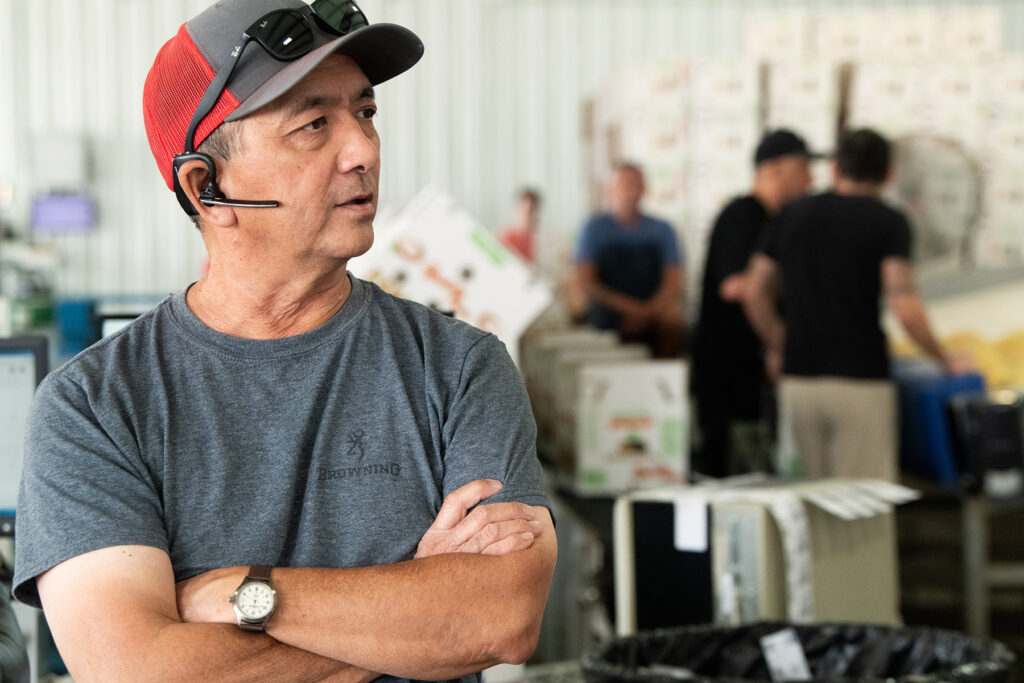
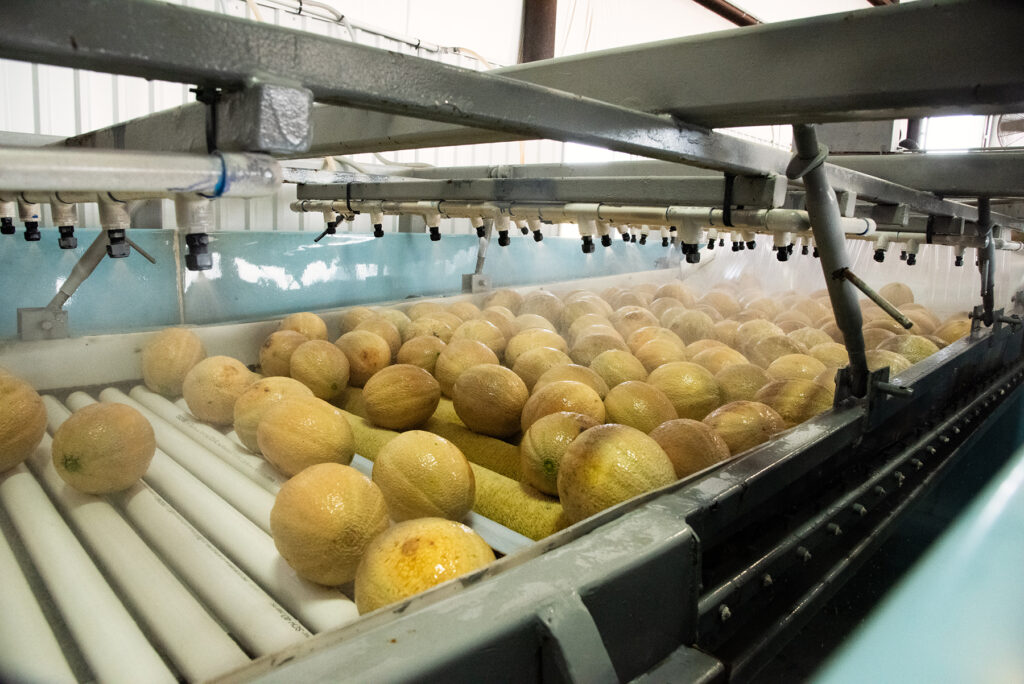
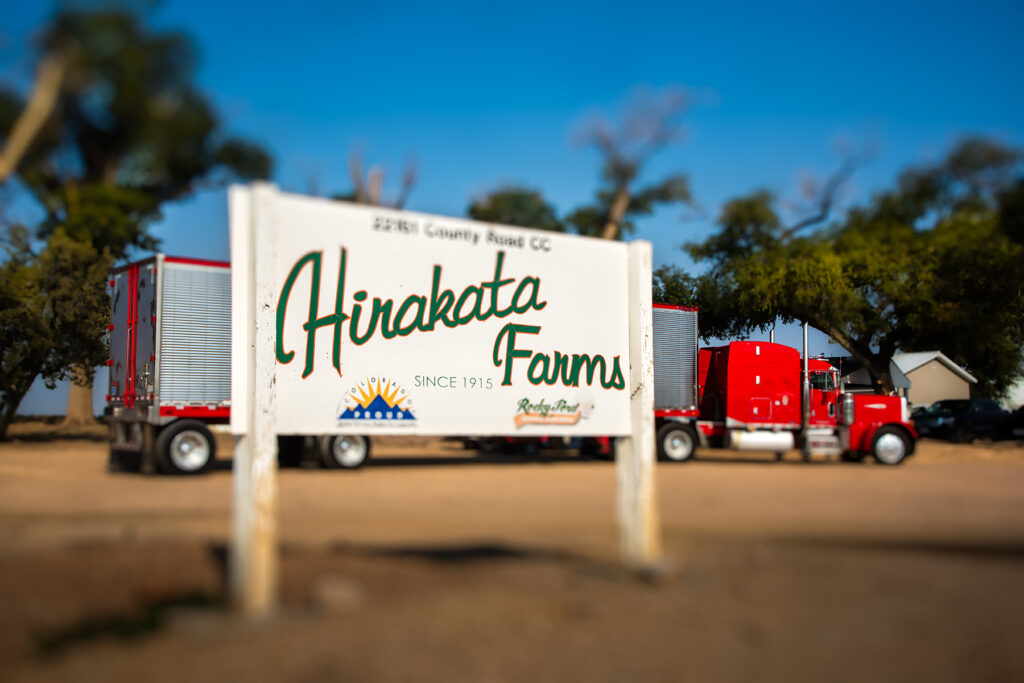
Glenn Hirakata, above, oversees melon processing in the Hirakata Farms packing shed, an enormous warehouse where melons are sorted, cleaned, labeled, and packed into cardboard boxes and bins for shipment to grocers. The farm has invested some $1 million in food-safety technology.
Their farm story started in the early 1900s with the Hirakatas’ paternal great-grandfather, Tatsunosuke, who immigrated to the United States from Japan. He landed in Seattle and worked on railroads as lines reached across the West. Tatsunosuke later settled in the Arkansas River Valley and started farming in 1915. He sent for his son, Keiji Hirakata, who traveled from Japan to Rocky Ford and later met his wife, Toki, who was from Las Animas, not far away. They were part of a small but well-established community of Japanese immigrants working on farms in the valley.
Keiji and Toki Hirakata farmed in Rocky Ford during cataclysmic historical events – the Great Depression, Dust Bowl, and World War II, all of which left an imprint on southeastern Colorado. The couple talked little of those times, their grandsons remembered.
Yet, Glenn and Michael Hirakata surmised the difficulties their grandparents faced, including the anti-Japanese sentiment that raged across the country starting in 1941, after Japan’s attack on Pearl Harbor propelled the United States into war. The Hirakatas and their children avoided Japanese internment camps, although one of the 10 prison camps, known as Amache, was just 80 miles east of Rocky Ford, in Granada. “I think some local business people vouched for them,” Glenn said of his grandparents and their children.
Her grandsons remembered Toki Hirakata carrying home-cooked food to her family members and farmworkers during long workdays outside. Her food revealed the region’s immigrant influences, from rice and tempura green beans, reflecting her own Japanese heritage, to handmade tortillas and bierocks, German pocket sandwiches filled with ground beef, onions, and cabbage.
Now, Toki’s house has been converted into the main office for Hirakata Farms, where Glenn Hirakata’s wife, Carmen, directs business operations. Glenn and Michael Hirakata lead the family farm, having taken over from their fathers, Gene and Jerre Hirakata; like other family members, the two attended Rocky Ford High School, home of the Meloneers. Two of their sons and a nephew have joined the family operation, representing the fifth generation at Hirakata Farms.
The Hirakatas said they are proud to realize the aspirations of their forebears. Their family history has shaped their outlook.
“I think any farmer is resilient – we’re always trying to be the ultimate optimist. But our heritage might have helped us not look back in life, always look forward. That’s what was instilled in our parents and grandparents,” Glenn said.
“Agriculture,” he added, “is not for the faint of heart.”
Photo at top: Michael Hirakata, left, and Glenn Hirakata are cousins and co-owners of Hirakata Farms, one of the most prominent melon farms in the Arkansas Valley of southeastern Colorado. They are fourth-generation growers on a family farm established by their great-grandfather, a Japanese immigrant.
SHARE
